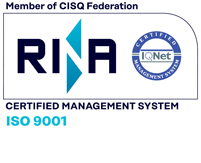Several and different options are available in order to conduct business in Italy, thanks to many reforms made to streamline and simplify the procedures required to start and operate a business in Italy. A business may be operated either as a sole trader or as a company. Both entities are governed by the Italian civil code.
A person may conduct a business either as an individual, or through the setting up of a new company or through the purchase of shares/quotes in an existing company. Such opportunities are available both for European and non-European citizens.
Discover more on our guide “Doing business in Italy”
A wide range of choices of legal forms for setting up companies is available and the main types are:
S.r.l (Società a responsabilità limitata) - limited liability company
As about Corporate Capital, the Law establishes different minimum thresholds for each kind of company. In the S.r.l.:
-
the capital consists of quotas. The minimum capital of a S.r.l. is equal to €1;
-
when setting up limited liability companies with capital equal to or greater than €10,000, at least 25% of the capital must be paid to the directors as previously indicated;
-
when the value of the capital is between €1 and €10,000, contributions may only be in cash and must be paid up in full on subscription;
-
the transfer of quotas may be limited and even prohibited; in which case, each shareholder will be entitled to withdraw from the company, obtaining a reimbursement for his/ her quotas.
Equity contributions:
- In both S.p.A. and S.r.l., the equity contribution can be made in cash as well as in kind subject to independent appraisal. Whereas, in the S.p.A. the expert is appointed by the Court, except in some specific cases, and the evaluation reviewed by the company’s directors.
Voting rights and special rights:
- in the S.r.l. the voting rights are proportional to the percentage of corporate capital subscribed by the quotaholders. Even if the by-laws may reserve some special rights to some quotaholders (e.g. administrative rights or the right to the distribution of profits), no different classes of quotas are allowed.
Governance:
- the S.r.l. provides different forms of management that include appointing a Sole Managing Director, a Board of Directors, or even a form of management where Directors are not appointed as a board and where they can exercise their powers jointly or separately, or, depending on the corporate governance model, collectively and others independently.
In the S.r.l., in order to make the best use of the flexibility of this legal form, it is important to pay attention to the preparation of the “articles of association” with the close assistance of a public notary who is then required to file them at the Business Register: only after the registration, the limited liability company comes into existence.
S.r.l.s. (Società a responsabilità limitata semplificata) - simplified limited liability company
In 2017 almost half of all the limited liability companies launched in Italy were of the simplified type: the simplified limited liability company (S.r.l.s.) is a form of “S.r.l.” introduced to encourage young entrepreneurship thanks to a minimum share capital of € 1, up to a maximum of € 9,999.99, the absence of notarial fees and a shorter constitutive process.
Legislative Decree no. 183/2021, which implemented EU Directive 2019/1151 of the European Parliament and of the European Council of 20 June 2019, made it possible to set up a limited liability company and a simplified limited liability company using a procedure that takes place entirely online under the control of the notary.
Notaries have been drawing up fully digital public documents for many years. Since 15 December 2021 it has also been possible for the notary to produce a deed of incorporation of an S.r.l. as a computerized public deed with the participation by videoconference of all or some of the parties involved.
In order to set up a company using this entirely online procedure, it is necessary that the company being incorporated be based in Italy and that the capital sums be paid by bank transfer into the notary’s trust account, which is held pursuant to Article 1, Paragraph 63 of Law no. 147 of 27 December 2013.
The deed can be signed using a digital signature or other type of authorized electronic signature. In order to allow this method of signing, the notary can, by using the platform, issue a suitable electronic signature to any party who is without one.
S.p.A (Società per Azioni) - stockholding companies (company limited by shares)
As about Corporate Capital, the Law establishes different minimum thresholds for each kind of company. In the S.p.A.:
-
the capital consists of shares. The minimum share capital of a S.p.A. is equal to € 50,000.00 (at least 25% to be paid into the hands of the directors).
-
the amount of the share capital must be stated in the certificate of incorporation. Shares do not have to reflect shareholders’ overall investment in the company.
-
the shares are freely transferable. It is normal practice to issue physical share certificates although in listed companies it is also permissible for shares to be in book-entry form.
-
the company limited by shares is the main type of trading company best suited to substantial investments with a large number of shareholders. It is also the compulsory type for those companies wishing to be listed on the stock exchange.
Equity contributions:
- in both S.p.A. and S.r.l., the equity contribution can be made in cash as well as in kind subject to independent appraisal. Whereas, in the S.p.A. the expert is appointed by the Court, except in some specific cases, and the evaluation reviewed by the company’s directors.
Voting rights and special rights:
- the voting rights in S.p.A. might not be proportional to the percentage of corporate capital subscribed by the shareholders and the by-laws can provide different typologies of shares.
Governance: the S.p.A. can establish different governance models:
- traditional system (shareholders’ meeting, Board of Directors and Board of Statutory Auditors);
- one tier system (Board of Directors and management control committee appointed among the members of the board) and two tier system (Management Board and a Supervisory Board).
A S.p.A. will pay its expenses and debts with its own assets, with its own capital and economic resources generally. Shareholders are not liable for the debts with their personal property and are not obliged against the company. A joint stock company will be formed on the basis of a public deed drawn up by a notary. The Company’s existence will only be recognised if it is registered at the Business Register. The notary will be required to upload the Deed of Formation and other necessary or appropriate company documents in the competent office of the Business Register as part of the registration process.
S.a.s (Società in accomandita semplice) - limited partnership
The limited partnership has two categories of partners:
-
general partners (“soci accomandatari“), who are responsible for the administration and management of the company and who have unlimited liability for the fulfillment of partnership obligations;
-
limited partners (“soci accomandanti“), who are not directors and will be liable for partnership debts within the limits of the investment made in the partnership, subject to certain exceptions governed by law.
The partnership name (business name) must contain the name of at least one general partner and an indication that it is a limited partnership. If a limited partner’s name is included in the partnership name, he or she will have unlimited liability, jointly and severally with the general partners, for partnership debts.
Limited partners cannot perform acts of administration or negotiate or do business in the name of the partnership, except when granted a special power of attorney for specific business activities. Any limited partner who disregards this prohibition will take on unlimited liability for all partnership debts and may be excluded from the partnership itself.
S.n.c (Società in nome collettivo) - general or unlimited partnership
The company’s business name must contain the name of at least one of the partners and an indication that it is an unlimited partnership.
The members have unlimited liability for partnership obligations and there can be no agreement to the contrary. When seeking repayment of debts owed by the partnership, creditors must first enforce them against the partnership before applying to the members. The unlimited partnership is subject to bankruptcy law with the contemporaneous bankruptcy of all partners.
The partners generally have separately exercisable powers of administration and representation. If agreed, powers of administration may be reserved to some members only.




